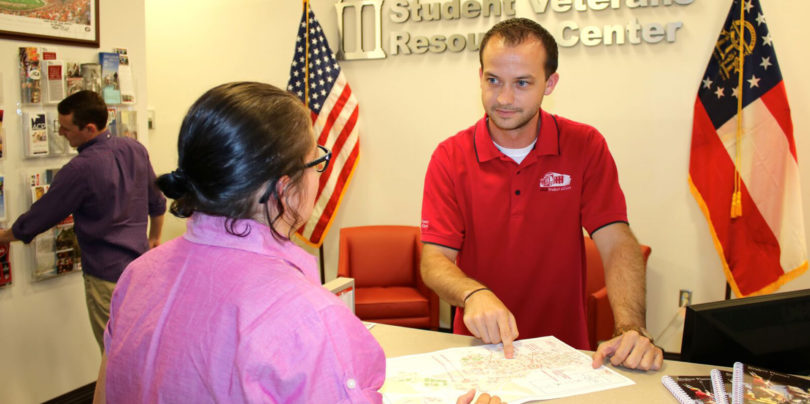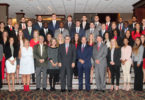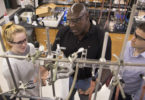By Erica Hensley, UGA News Service
Military veterans don’t always easily find common ground outside of their mutual service. Ted Barco in the University of Georgia Student Veteran Resource Center is working with his student staff, like Justin Sailers, to change that.
“Hey Justin, are you and I the same?” Barco asked, joking as he referenced the ingrained differences among the military branches. Barco, twice retired from the national security arena and a former U.S. Air Force lieutenant colonel, is director of the SVRC, which rests atop the Tate Student Center lobby.
“Not exactly,” replied Sailers, a combat Marine veteran and fourth-year finance major, who works part time under Barco in the SVRC and serves as president of the Student Veteran Association, a student-run organization that works in tandem with the SVRC to foster veteran engagement at UGA and in the community.
What the two veterans have in common is a commitment to helping UGA’s student veterans succeed.
The average age of the student veterans at UGA is 30. Of the roughly 200 student veterans at UGA, half are undergraduate students, half of them have spouses or children, and more than half are working while attending school, Barco said.
Sailers, 27, acclimated to UGA quickly after he transferred from community college last year, and said spending time in the SVRC through his office job and organizing service projects helped him network and create unique career opportunities.
“Between hard work and happenstance, I benefited simply by existing in the SVRC space,” Sailers said. His experience working at the SRVC and spearheading the SVA built invaluable experience and a rewarding rapport with Barco, he said.
Sailers’ Marine leadership and civilian management roles helped prepare him for life at UGA, but not all student veterans experience as smooth of a transition, according to Barco.
“The challenge with our student veterans is that as nontraditional students they are often pulled in multiple directions at the exact same time with school, family, work and health issues,” Barco said. “This challenge is compounded by a sense of self-reliance, which at times may work against their long-term career interests.”
That means that some student veterans may not readily seek out help from departments and units they aren’t familiar with. With that in mind, Barco has been building partnerships with resources like the University Health Center, Registrar’s Office, Financial Aid, Admissions, Disability Resource Center and the UGA Career Center.
He uses a circular model to show how the SVRC works across boundaries to integrate and harmonize services that focus on student veteran success. Through these partnerships and programs, Barco can quickly adapt and respond to the wide-ranging needs of what he characterizes as the “most culturally diverse and globally experienced population on campus.”
The first aspect of his focus involves easing a veteran’s transition into UGA’s overall population and academic setting.
Identifying student-veterans
Barco receives calls year-round from veterans interested in attending UGA and strives to make sure they are prepared for the rigor of study and demands of a research university. From the time they apply to UGA, he uses institutional data to flag and invite veterans to a fall orientation, where an array of veteran-specific services is introduced to the newcomers.
Students who attend UGA through the post-9/11 GI Bill are easily identified, but veterans on scholarship or whose GI funds, which cover up to 36 consecutive months of tuition, have run dry are not as obvious from an administration perspective.
Barco and SVA members maintain vigilant visibility in hopes of attracting student veterans who did not self-identify on their application but are still looking for access to veteran, student or career resources.
The SVRC is ready and able to tailor-meet each individual need, Barco said. “This is not a one-size fits all approach.”
Connecting students to resources
The second stage of his approach enables veteran access to on- and off-campus resources that provide veterans with tools to navigate their time at UGA most successfully. The SVRC “is here to do what’s best for student veterans, whatever that might be,” he said.
Now in his third year at the helm of the SVRC, Barco has transformed the office, which formerly sat in the basement of Tate, to an accessible safe place that serves as a support network and source of right placing for student veterans.
In the past year, the SVRC has worked with the community to add nine awards and scholarships to ease student veteran financial strain, created a new certificate program for student veterans and established the Veteran Success Council, a board comprised of senior UGA leadership and co-chaired by Bill McDonald, UGA’s dean of students, and Ronald Cervero, associate vice president for instruction. The council identifies key hurdles to veterans’ success and then works across the university and community to mitigate them.
The SVRC office itself serves as an entry point to university engagement for student veterans. The SVA lounge now sits across the hall and offers a quiet study space.
The SVRC provides computer and conference room access, and a help desk manned daily by student veteran workers ready to share their knowledge of anything from veteran services and scholarships, to mentoring and internship opportunities.
While the SVRC makes it a point to offer access to on-campus health and wellness services-specifically a Healthy Vet Program run by the University Health Center that offers specialty and discounted services for student veterans-the organization focuses on easing transition to UGA, enabling access to a multitude of programs and services, and facilitating readiness, according to Barco.
“Most incoming student veterans are transfer students and may experience some degree of transfer shock as they transition” to a top-tier research university, he said. To ease some of the stress of the shift, the SVRC offers veteran-specific academic advising and a Got Your Six Transition Mentoring Program that pairs trained faculty and staff with incoming student veterans.
Preparing for the future
Because student veterans are on a strict timetable to graduate within the parameters of the GI Bill, it is vital to make sure they are ready for entry into a profession or graduate school by the time the funds are exhausted, Barco said.
To encourage readiness, the SVRC is piloting a Black Belt Certificate Program, in partnership with the Career Center, that awards a certificate to student veterans who participate in a mentoring program, serve in a relevant work-study, internship or study abroad, and hold a leadership position in one of UGA’s 700-plus student organizations. On Veterans Day, the SVRC and its partners will award eight student veterans the Black Belt Certificate for the first time.
The SVRC also provides two additional mentor programs, one which pairs juniors and seniors with graduate student veterans, while the other, a capstone corporate mentoring program, connects students to working professionals through American Corporate Partners for a yearlong mentorship.
Matt McDowell, a Navy veteran pursuing a master’s degree in engineering, has served as a student veteran mentor while enrolled at UGA, so he’s used to interacting with student veterans trying to navigate the terrain in higher education.
“The mindset of a self-sufficient vet doesn’t always mesh with an academic setting,” McDowell said. But as a mentor, he strives to reinforce the importance of internships and developing relationships through networking.
McDowell exhausted his GI Bill benefits seven years ago, but persisted in funding his education by both working for the university and Sandia National Laborites-all while completing his thesis and serving as a peer mentor through the SVRC.
After teaching himself stock trading and personal investment, Sailers led a budgeting class for fellow Marines while serving in Iraq, and unlike most students, entered his first class knowing what career he planned to pursue.
Sailers partly credits his summer internship with a financial advisory firm to the SVRC’s career support, as well as his own persistence and ambition.
“I started my college career knowing exactly where I was going,” Sailers said. And with the support of Barco, he’s positioned to get the finance job he’s been preparing for.
While serving a population as diverse as student veterans can be complicated, UGA’s tailored approach is working, Barco said.
“Everyone at UGA wants to help student veterans,” Barco said, “and we’re showing them how.”








